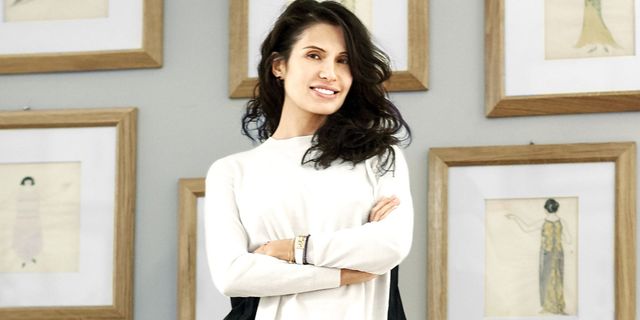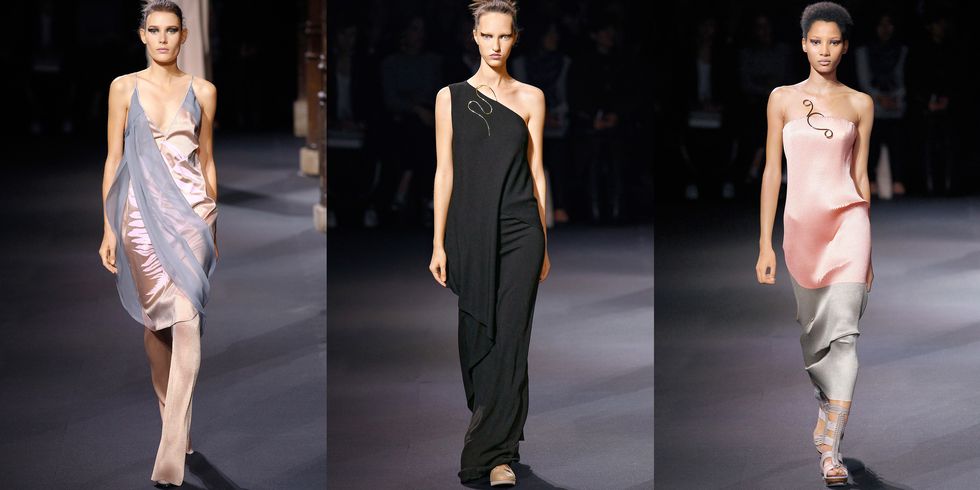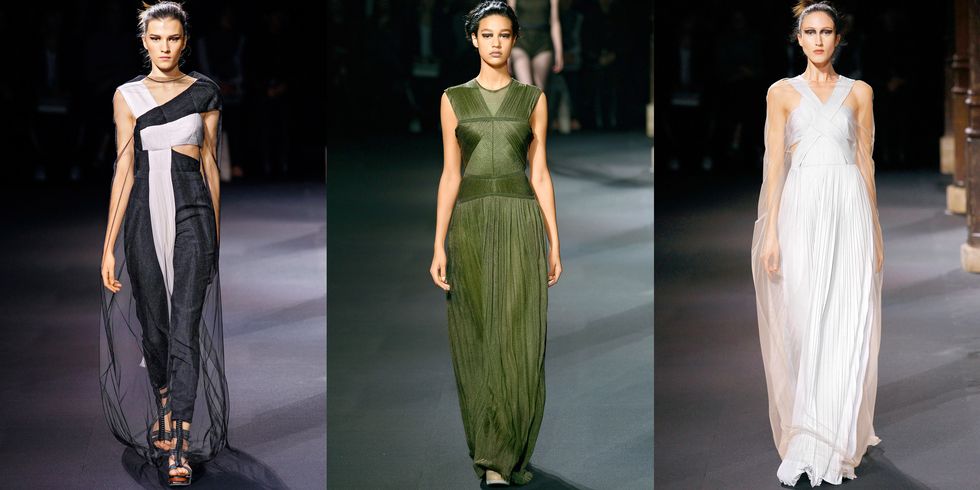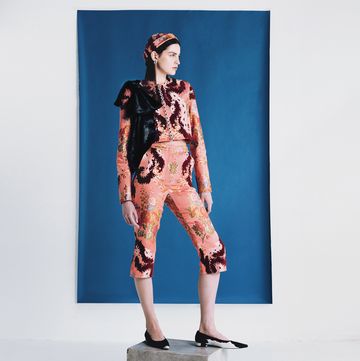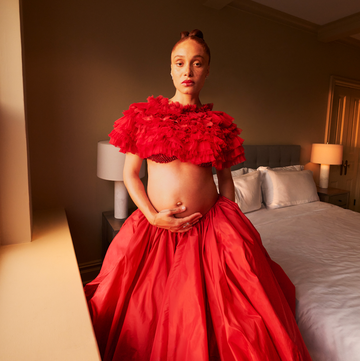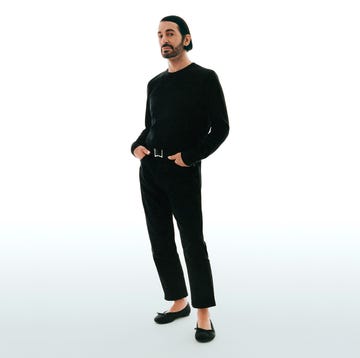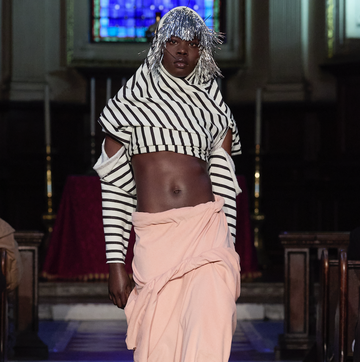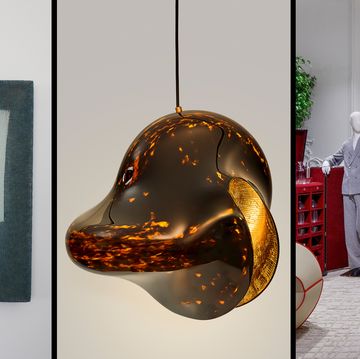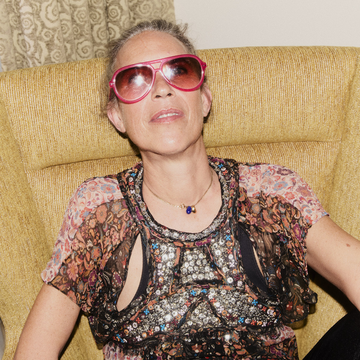8:00 A.M. Goga Ashkenazi, the 36-year-old Kazakh oil oligarch turned owner and creative director of Vionnet, awakes in her 19th-century palazzo in Milan, which she rents from an adorable marquesa who lives on the top floor. Five foot 10, with thick black hair piled on her head, Goga descends the twisting Gio Ponti staircase to the gym she installed in the basement for some Pilates. "That's the only way to make exercise doable," she says in her lightly accented English, the result of a British boarding-school education. "I'd never get round to it otherwise."
8:30 A.M. Goga showers. Afterward she sits in her dining room surrounded by works by Picasso and Marc Quinn (there's a Tracey Emin neon sign and a Warhol print in an adjoining sitting room, and she estimates that she has 500 pieces of art altogether), looking out over the wisteria-clad courtyard and swimming pool. "So rare to have a pool in Milan," she says. "And guess what? I've never swum in it! During the week I work, and on weekends I like to be in London to see my sons." Goga's sons, Adam, eight, and Alan, four, live with Goga's mother, along with a tutor and a nanny for each boy, in her mansion in Holland Park, where neighbors include David and Victoria Beckham ("Our boys went to the same school, but I don't really know them").
8:45 A.M. Goga goes back upstairs to inspect her two-story walk-in closet. Today she selects a Vionnet pleated-leather maxiskirt, a jade top with chiffon sleeves, sheer patterned hose, and high-heeled sandals. A zipper tattoo runs up the back of her neck. "I had it done when I bought Vionnet, in 2012," she says. "So I'm always wearing one of our dresses."
9:00 A.M. Goga's chauffeur-driven Audi carries her the short distance to her office. "I'd like to use my bicycle more to go to work, but then I'd feel guilty that my driver had nothing to do all day," she says with a sigh. Goga grew up in Moscow and made her money in her mid-20s. "I used to hate going to work," she says. "Financial success was a driving force; it's difficult to turn your back on it. But oil and gas always felt like something I had to do. It never felt like my final destination. In that old life, I never enjoyed myself like I'm enjoying myself now."
10:00 A.M. In a brightly lit atelier, Goga oversees the Prefall 2016 collection. She fires questions at her team of designers in a mix of English and Italian. Frowning over a Lurex swatch ("Madeleine Vionnet always used metallic thread, so we're always trying to find new ways of doing it without it being too shiny, rough on the skin, or naff"), she recalls growing up in Soviet Moscow, where her father was a member of President Mikhail Gorbachev's inner circle. "It was a planned economy, so everyone wore the same clothes. It was as if the only shop was Zara, and everyone bought their clothes there," she explains. "But ateliers were available to a certain level of individuals, and my mom was one of them. Fashion magazines were illegal, but we'd pass around old copies and have clothes made inspired by them." She customized her school uniform. "I got away with it because I was good at school." In fact, she has a degree in modern history and economics from Oxford University—albeit third-class. ("I did too much partying, but no regrets.")
10:30 A.M. Goga meets with her team. As a leader, she's firm but friendly—there is a lot of laughter and joking. "When I bought Vionnet I didn't want to be creative director," she says. "It was not my intent to come in and hire and fire people. I tried to work with the existing ones, who were very talented, but then they left me in the middle of a collection. I was like a child thrown into the depth of the sea, but I struggled my way out and really learned every single little thing." The critical reactions to the early Vionnet collections under her watch were initially harsh but since then have steadily improved. "In my early days here, we were being creative for the sake of creativity, and the collections were 100 percent about Goga," she says. "Now they're 10 percent Goga. I want all women to love them."
1:00 P.M. She is running late for lunch with her friend Claudio Tesauro, president of Save the Children Italy, at the Mandarin Oriental. They're discussing a village that Goga sponsors in Mozambique as well as dates for her to visit. "We've tried three times, but twice there was a war, and once the dates didn't fit," she says, then orders a spritzer with white wine, sparkling mineral water, lemon juice, and mixed berries ("It's a Swiss recipe"). "How about April?" she offers. "I'll bring the children, and they can go on safari in South Africa while I'm in Mozambique."
3:30 P.M. Goga re-commences the knitwear meeting. She rejects a pair of black jogging bottoms—"Oh, my God, what can I say? Kill them"—but then the model pulls them over her head and puts her arms through the legs, so it becomes a top. Goga beams in delight. Afterward she goes downstairs to discuss shoes and bags with accessories designer Diego Dolcini. Dolcini smiles. "Goga's the future; she's my muse," he says. "But not too much your muse," she reprimands him. 5:45 P.M. She answers e-mails and Skypes in her office. "Thank goodness for Skype," she says. "I call my boys nearly every day. It's my way of seeing if Adam is playing Minecraft. I can always tell because if he isn't he answers immediately."
6:00 P.M. Goga's mind turns to dinner. She's determined to go to her favorite seafood restaurant, Langosteria 10, but Dolcini discovers that a table is available only between 7:30 and 9:30 P.M. "We'll never make it so early," she laments. "I know! We'll send someone for 7:30 P.M. to keep the table for us." She begins WhatsApping friends to see who is in town.
8:00 P.M. She arrives at Langosteria 10 and orders lavishly for the table—plates of seafood, sea-urchin pasta. "Goga loves to eat," says her friend Eva Cavalli, the Austrian-born wife of Roberto, who is currently staying with her while house-hunting in Milan.
10:30 P.M. Goga returns home, where she often plays Chopin or Debussy on her Steinway in the evening. "It's a form of meditation for me," she says. "When I was a child, my mother made me practice piano six hours a day, and I hated her for it, but then I didn't want to stop. Living in Milan can get lonely," she continues. "My house in London is so noisy, but here it's so quiet, so I have a sort of open house. I'm great friends with Giacomo Loro Piana. He gave me some bongos, and often in the evening we end up with him on the drums, me on the piano, and we call in a DJ." In a moment she will head upstairs for a bath. "I take one religiously every night, with a kilo of salt "to take bad energy out," along with lavender oil to relax and tea-tree oil because of its anti-inflammatory properties. As we part, Goga muses on the bizarre trajectory of her life. "People thought I'd gone insane when I bought Vionnet, that I'd lost the plot," she recalls. "But I'm not living to prove anything to anyone. I've made mistakes—there was a point of my life when I was slightly without a conscience. I was trying to seem to be something, but then someone I deeply respect said, 'Goga don't seem; just be. It will liberate you.'"
